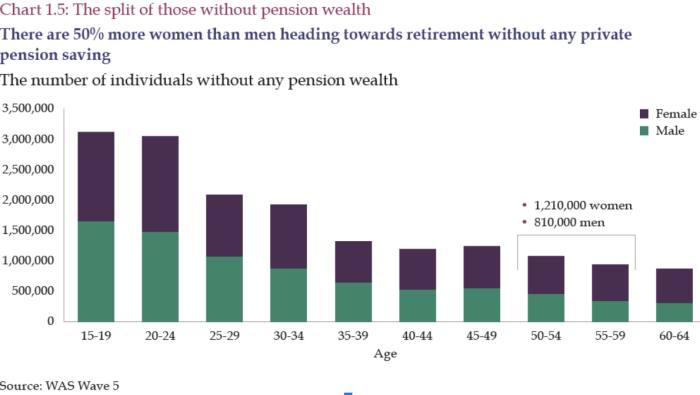
Pensioners wholly reliant on the state pension will face tougher times ahead in terms of real spending power should the triple lock end or be watered down, an adviser has warned.
Fiona Tait, technical director for Intelligent Pensions, is concerned any abandonment of the earnings link as part of the triple lock promise would disproportionately affect women.
She explained: "The bottom line is that proportionately more women are wholly reliant on the state pension than men and are likely to suffer more if the triple lock is dropped or watered down.
"Without the triple lock they will still receive a guaranteed pension, but their purchasing power may erode over time."
Tait said this would be of "even greater relevance to women", as due to interrupted working patterns and lower earnings, they are more likely to rely upon it as their main or possibly only source of income.
She highlighted data from the Pensions Policy Institute (pictured above), which showed 50 per cent more women than men are likely to have no other pension income in retirement.
In August, the Office for National Statistics issued a headline 8.8 per cent earnings figure, followed by a revised, lower figure, which sent economists at the Exchequer into action, concerned about the way in which the current triple lock mechanism for uprating the state pension might mean billions of additional pounds are needed to meet the promises.
As a result, chancellor Rishi Sunak said the government would look to revise the way in which the earnings element of the triple lock works.
But as Tait commented, it is "not entirely true" that younger workers - female or otherwise - would not benefit from the higher indexation afforded by the triple lock.
She said: "As each increase is applied on top of the one before everyone who qualifies for the state pension in future will, in theory at least, receive a higher State Pension when they themselves comes to retire."
Tait said there were always concerns about the sustainability of the triple lock prior to the pandemic, but the impact of a year of furloughs and job losses, followed by a year of re-employment and growth, meant the problem has now "become acute".
What the ONS figures said
ONS figures in August showed that earnings rose 8.8 per cent, which is more than twice the value seen in any previous year since the triple lock was brought in, and well out of line with the other two measures: prices and the 2.5 per cent floor.
The ONS suggested adjusting for the pandemic would result in a more realistic ‘underlying’ figure of between 3.5 – 4.9 per cent, which Tait said meant the state pension would still increase.
However, Tait also warned it was important for women to start saving early and not rely on state pension entitlement.
She added: "Women are more likely to take a career break, and those who return to work often do so in lower paid jobs.





